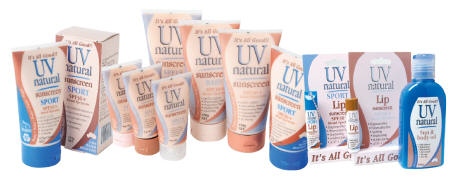Blog Post
It’s time to read your sunscreen labels and stop poisoning yourself

We all know that the sun provides all sorts of health benefits, including helping our bodies manufacture vital vitamin D. Your body is designed to produce the vitamin D it needs which happens when your bare skin (without sunscreen applied) is exposed to sunlight. Exposing your skin for a short time will make all the vitamin D your body can produce in one day in just a little under the time it takes for your skin to turn pink. You don’t need to tan or burn your skin to get vitamin D.
Studies suggest that between about a third and a half of Australians have at least marginal vitamin D deficiency. This is due to a number of factors including our long work hours, lack of outdoor activity and our love affair with sunscreen. It is also shown that Australians have the highest rate of skin cancer in the world.
So what we need is balance… Enough sun exposure on our bare skin to make enough Vitamin D; but not enough so that it burns our skin and causes skin cancer.
It is important to not only expose our skin to the sun for a period of time, but ensure we apply a quality natural sunscreen following the desired exposure. The problem is, not all sunscreens are created equal. The vast majority of sunscreens available contain toxic chemicals or fail to provide enough protection against UV rays.
Whilst there may not be a ‘perfect sunscreen’, there are certainly ‘better’ options out there. Read your sunscreen labels and know what’s in your sunscreen. A safe sunscreen (like zinc oxide) is your best bet when it comes to protecting your skin from harmful UV rays.
Avoid the following:
- Retinyl Palmitate – is a form of vitamin A, an anti-aging antioxidant that may trigger skin tumours and lesions when sunlight hits it.
- Oxybenzone – which is a common sunscreen ingredient, is an allergen and hormone-disrupting chemical which penetrates the skin, gets into the bloodstream and mimics oestrogen in the body. Oxybenzone has been linked to endometriosis in older women and lower birth weights in newborn girls. It can also trigger itchy, eczema-like allergic reactions.
- Spray sunscreens – are difficult to apply correctly and pose serious inhalation risks.
Take steps to prevent overexposure and sunburn by taking these sun-protective measures:
- Wear a hat, sunglasses and protective clothing
- Seek shade
- Avoid peak sunlight for extended periods of time
- When you do choose to use sunscreen, make sure it’s a natural, chemical free sunscreen.
As an aside, you can increase your skin’s resistance to damage, aging, and even cancer with certain healthy foods. Plants have their own built-in protection against the damaging effects of the sun. When you eat foods that come from these plants, you consume those protective compounds, which helps boost your skin’s ability to protect itself.
